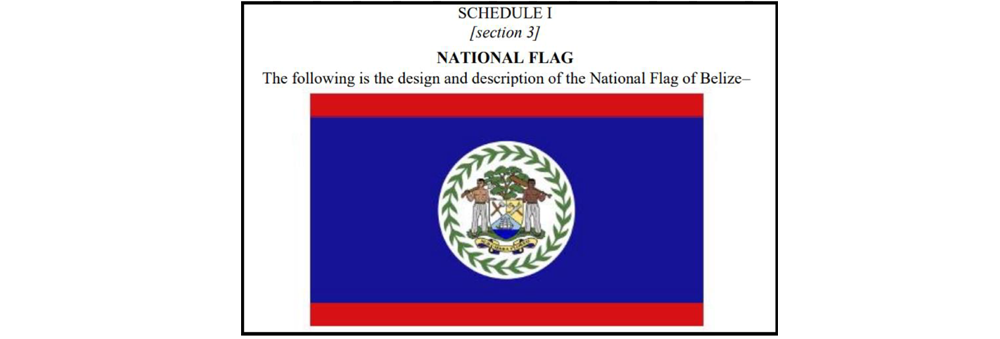BELMOPAN, Fri. Feb. 9, 2025
Although he said he had a difficult time getting his colleagues to agree, Opposition Leader, Hon. Moses “Shyne” Barrow reported to the House of Representatives today that the United Democratic Party was supporting the National Symbols Bill, 2025, that was introduced just today. He shared that while others in the Party are calling it another tax, as a creative, he recognized it as being a form of protection of intellectual property, which he said he knows all about. He credited intellectual property rights as key to the fulfillment of his dreams and to the fortune that he was able to make. As such, Barrow said he understood that the national symbols “are the intellectual property of the state on behalf of the people of Belize.” He then added, “I would hope that you continue in this direction when it comes to the political organizations, and that you would require that they be registered so that their flags and their names, and all of these things—we don’t have the type of confusion that we are having right now — so you are headed in the right direction.”
With the new bill, the Government intends to regulate the commercial use of Belize’s national symbols, including our coat of arms, flag, national anthem, national prayer, and our national bird, tree, flower and animal.
The bill requires that those wishing to use any of the national symbols to manufacture for sale, or offer for sale, goods or items on which the symbols are reproduced, obtain a license granted by the Minister of Culture. We note that, while Minister Francis Fonseca says it will be a one-time license, this is not specified in the current version of the legislation and Schedule VI that sets out the sample license, which contains“Valid From:” and “Valid To:” lines.
The penalty for the contravention of the proposed law is $1,000 or one year imprisonment. Repeated offences will carry a fine not exceeding one hundred dollars for each day or part thereof that the repeat offence continues after a conviction. Included as an offence is the mutilation, cutting, tearing or defacing of the Coat of Arms or the National Flag “whether by writing, printing or stamping thereon or otherwise without lawful authority or excuse.”
The bill also provides for the minister to make regulations to set out royalties payable for the use of representations of the National Coat of Arms or the National Flag on items for sale or advertisement.
Opposition Leader Barrow did share some concerns about regular citizens, including a business wanting to fly a flag in their yard to express their patriotism. He said such use should not require a license, and Minister Fonseca responded that it does not. Barrow also recommended that, rather than passing another bill with ministerial discretion, that a regulatory body be set up for the license approvals. In that regard, Fonseca commented that this system is what currently exists, and that he hopes it is reformed through the People’s Constitution Commission process.
As it relates to creatives who, for example, may want to paint the symbols, Barrow affirmed that their right to do so should be clearly stipulated in the bill. Fonseca reiterated that the bill focuses on commercial use “and does not, in any way, impact the private citizen from using the flag, flying the flag, marching with the flag … and I made it very clear that the artistic use of the national symbols – that is not affected at all by this bill.”
The bill proposes that those who have used our national symbols before the act comes into force can continue to do so up to six months.
Other bills passed
The five other bills introduced include: (1) the Fiscal Incentives (Amendment) Bill, 2025, to allow registered co-operative societies to receive fiscal incentives; (2) the Stamp Duties (Amendment) Bill, 2025, to make clarifying amendments to the Stamp Duties Act; (3) Insolvency and Bankruptcy Bill, 2025, that will allow insolvent persons to enter into arrangements with creditors, and administration procedures for businesses, receivership, liquidation, and the like; (4) Belize Companies (Amendment) Bill, 2025, to provide for the administrative restoration of a company that has been dissolved; and (5) the National Assembly (Powers, Privileges, and Immunities) Bill, 2025, to secure freedom of speech in the National Assembly, regulate admittance to the precincts of the National Assembly, and to provide protection to employees in the publication of reports and papers of the National Assembly, among others.
Collet area representative Hon. Patrick Faber complained that they had not been provided with copies of the new bills beforehand, particularly when the intention was to pass them in one sitting.
Hon. Tracy Panton, the Albert Division area rep, called it “democracy denied,” and stated that it is clear that “we are clearing the docket as we prepare for the next general elections.”
Prime Minister John Briceño replied that this was an exception; and in the case of the Belize Companies (Amendment) 2025, he said there was no time due to many companies having been cleaned out when the Government modernized the companies registry. He explained that as it turns out, many companies still had assets in their name, and based on the existing act, their assets could be taken over by the state. The impacted businesses therefore entered into discussions with the Government, which PM Briceño says only recently concluded, and it went to Cabinet on Tuesday, February 4.
Brought back for second reading was the International Merchant Marine Registry Bill, 2024, to establish the Registry as a statutory body; the National Health Insurance Authority Bill, 2024; and the Law Revision and Law Reform Bill, 2024. The second reading of the latter two bills was deferred to a later date. All other bills were passed.

